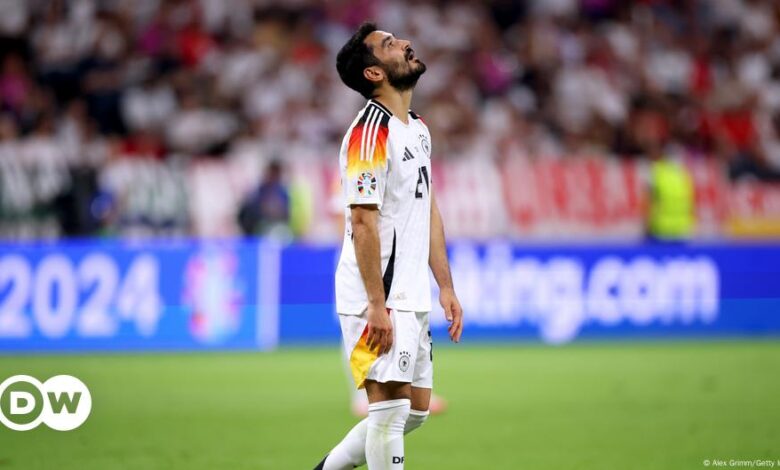Expert: Busy schedule means early retirement for footballers – DW – 10/18/2024

“Footballers are often playing at or above their performance limit,” Professor Wilhelm Bloch of the Sports University Cologne told DW in an interview.
The sports scientist is among those who question whether players can sustain such exertion at a high level of performance in the long term without suffering damage. This comes as the footballing calendar is constantly being extended – and the games become more and more intense.
Julian Alvarez, who moved to Atletico Madrid from Manchester City in August, is among the male footballers who played the most games last season. According to the players’ union FIFPRO, the attacker played 75 games for Manchester City and Argentina’s national team.
No regeneration, no performance
Former Germany international Ilkay Gündogan also has two busy years behind him. Between July 2022 and 2024, he made 129 appearances for club and country, playing an average of around 82 minutes per match.
Gündogan also spent around 9,000 minutes traveling during this period. There wasn’t much time for recovery phases, which can be a problem.
“The recovery times after matches are too short. In this condensed calendar, there are hardly any phases when you can conduct build-up training or have a more complex regeneration phase,” said Bloch. “The body needs a targeted build-up.”
But given the tight match schedule, there is not enough time for this, he added.
‘Not sustainable in the long term’
National leagues, international tournaments and international matches – the top stars hardly have any time to recover between games. The result: more strain and more injured players.
“This is not sustainable in the long term,” sports scientist Bloch explained. “The systems will be exhausted and then you’ll have a lot of absentees and a lot more injuries.”
Germany coach Julian Nagelsmann also felt the effects of this recently. During the October international break, he had to do without eight players, ruled out for one or both of Germany’s Nations League matches in Bosnia and Herzegovina and against the Netherlands.
The criticism from the players is growing louder.
Real Madrid and England midfielder Jude Bellingham has spoken of being left “mentally and physically exhausted” by the “crazy” fixture calendar.
Barcelona star Robert Lewandowski also criticized the busy schedule.
“At the end of the day, we’re only human. Of course we try to be a machine on the pitch, but we mustn’t forget that we’re human too, and we also need time to rest properly,” the Poland striker said.
FIFA and UEFA extend competitions
Some players, such as Spain’s European champion Rodri, are even talking about player strikes if the situation does not change. The footballers are supported by the players’ union FIFPRO and sports physicians are also sounding the alarm.
But the criticism is still falling on deaf ears at the world and European governing bodies. UEFA has extended the Champions League and Europa League in the current season. The FIFA Club World Cup will be held with 32 teams for the first time next year and the next World Cup in the United States, Canada and Mexico in 2026 will feature 104 instead of the previous 64 matches.
‘The risk of injury is increasing’
“The muscles usually need four to five days to fully recover after a 90-minute football match, depending on the strain on the player,” said Bloch, who again noted that due to the schedules, players often aren’t getting this time.
“Micro-damage to the muscles occurs during high exertion,” he added.
“This damage isn’t bad, but if there isn’t time for it to repair, then it becomes a problem.” This, he said, is bound to increase the risk of injury.
Shortened playing careers
The rhythm of playing a match per week is sensible, and weeks when teams are forced to play two games should be kept to a minimum, he stressed.
“Every player needs a block of around six weeks per year when they are taken out of the game,” he said. This is not possible for those who play internationals between club seasons, especially when they are also forced to play pre-season friendlies in far-away places to boost club coffers.
“The players go on vacation for two or three weeks and then it starts again,” he added.
Bloch fears that players’ careers will be much shorter in the future.
“We will no longer have players who play football until the age of 34 or 35, but we will have players who are completely spent at the age of 29,” the sports scientist said.
The increased workload is thought to have a particular affect on young players, who are under greater pressure today than in the past.
According to a FIFPRO study, Germany’s Florian Wirtz of Bayer Leverkusen, still just 21, has already played around 11,500 minutes of professional football. Michael Ballack, who retired in 2012, had played just under 4,200 minutes by that age.
Players only being ‘patched up’
When the Germany players returned to their clubs following the international break, not all were unscathed. Leverkusen issued a press release stating that Wirtz had suffered a capsule injury in his right ankle during the match against the Netherlands.
“It is still unclear when Wirtz will return to training,” the Werkself stated.
The limit has been reached – on this the players, the players’ union and sports scientists all agree.
“The medical departments are just busy patching things up. This helps neither the players nor the clubs,” Bloch concluded.
This article was originally published in German.




